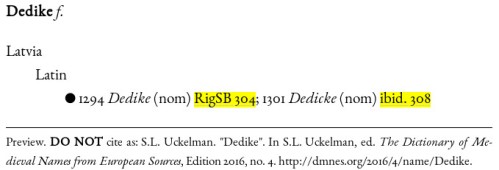Every Monday we will post an entry that hasn’t yet been published with a view towards harnessing the collective onomastic power of the internet. If you have any thoughts about the name’s origin, other variants it might be related to, other examples of its use, etc., please share them in the comments! If you wish to browse other Mystery Monday names, there is an index.
Let’s head to Latvia! In the 13th and 14th C, names were predominantly of Low German origin, and this is clear even when the names occur in Latin documents, as our two examples of today’s mystery name do:

It is clear that this is a diminutive of something — the -ke ending is a giveaway. When the name is used by men, it is a diminutive of Theodoric, via the Low German form Dederik. However, the two examples that we have here are definitely feminine. For example, here is the entry for one of them:
![]()
There is no way “Lady Dedike, wife of Hinrich Westfal” could be anything but a woman. The question is: What name is this a diminutive of? Do you have any thoughts?

It is obviously some name beginning in Diet-, but one cannot be sure which one. It could be a genuine feminine name like Dietlind or Dietgard, or a feminisation of Dietrich like Diedrika/Diedrike. Also a monothematic Dieta/Dieda/Deda is possible as surce name.
Have you found any other evidence for a fem. form of Theodoric/Dietrich/Dederik? The masculine name was enormously popular, but we have no feminine examples yet.
Hmm… names ending in -rika or -rike (like the moren names Hen(d)rike or Ulrike) seem become popular only rather late. For early medieval names, Foerstemann (1900) says:
Feminina, nur aus geschwächtem sprachgefühle
erklärlich, sind höchst selten; ausser dem eben erwähnten Austriga etwa noch das westfränkische Hoctorecia 6 ; ganz zweifelhaft ist Quistricia 8 aus Spanien; am Niederrhein zeigt sich ein Modericha 11.
(Entry RICJA, column 1256; the number after the names denote the century of attestation)
moren should read modern
I don’t know how old the usage is, but both Dedeke and Dideke are found as Dutch feminine names, originally monothematic diminutives.
Dedike / De Dikke: the fat one.